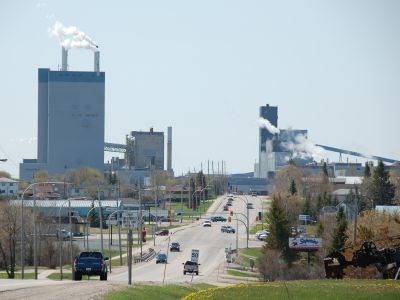It wasn't long after James Harvey moved his young family into a middleclass neighbourhood in Whitby that he was secondguessing his choice of home.
A multiple stabbing at a New Year's Eve house party across the street had his block bathed in searchlights with police dogs and forensics specialists combing through his front and backyard.
“I was thinking, this is not how I want to raise my kids.”
When the vacancy to run the Dryden Development Corporation appeared last winter, the Toronto native jumped at the opportunity.
Harvey is no novice to the North having spent eight years as an advisor to provincial cabinet ministers Michael Gravelle and David Ramsay.
The job stability is a welcome change and he doesn't miss the two-hour daily commute to Queen's Park. But in his conversations around town, he's been fielding the same question.
“Why are you here? It's the quality of life, I couldn't ask for more.” Since arriving in March, Harvey has been connecting with business leaders and company owners in assessing his new home with a fresh set of eyes.
The Domtar pulp mill dominates the skyline for kilometres around, and although it only employs about 350, a far cry from its heyday of 1,500, the plant impacts the local economy and consumer confidence.
Capital upgrades like a $22-million topping turbine generator and surplus heat condenser have boosted residents' spirits that the mill has some longevity.
But like his predecessor, Harvey is preaching economic diversification and “outside the box” thinking. There's much to work with.
He's intent on widening Dryden's profile as a regional service hub, especially in catering to mineral exploration companies.

James Harvey, Dryden Development Corporation manager
That means talking with promising juniors like Treasury Metals, Laurentian Goldfields, Tamaka Gold and Manitou Gold about their supply needs and communicating that to local companies.
Forestry still remains in the picture with the potential for a wood drying and planing facility being studied.
In his discussions with consultants and local operators, Harvey said there is a defined need for a supplier of green lumber that can be dried and dress it for use in making furniture or decking products.
The community has room for growth with two serviced industrial parks, zoned for manufacturing and commercial, all ready to go.
With a thriving Wal-Mart on the Trans-Canada Highway, Dryden's retail sector draws in shoppers from Ignace, Sioux Lookout, Red Lake and surrounding First Nation communities.

David Durance, owner of Kano Reid general store
Harvey wants to tabulate those numbers to lure more name-brand retailersand chain restaurants to town, and match them up with potential franchisees.
“I think it's astronomical and I don't think people realize it.”
Harvey's job entails not only attracting outside business, but finding ways of better showcasing and promoting the homegrown ones.
A downtown revitalization study has opened a dialogue to explore ways to bring motorists off the highway retail strip and into a more healthy and vibrant downtown.
Some entrepreneurs have already laid the groundwork by filling once-vacant storefronts in a stagnant core.
One new shopowner who's creating a buzz is David Durance of Kano Reid.
Though only in business for a year, he's won three chamber of commerce awards.
The name for his King Street general store was inspired by two important figures in his life, the founder of judo and his grandmother.
He attributes the new vitality downtown to many residents, like himself, using their skills to go into business.
Durance was laid off from a sawmill job in 2003 and served on labour and community adjustment committees during the rounds of plant downsizing.
“There were a lot of people who made the decision to stay and they decided, what are we going to do to earn a living? Some went back for training as nurses, teachers and variety of fields. Others found employment in the business sector.”
Durance, who renovated a former jewellery store, has an extended family with a rich legacy of entrepreneurship as shopowners.
Without question, he said the downtown has taken hits over the years because of instability at the mill, but also because of a lack of succession planning by many retiring shopowners.
But as commercial buildings emptied out, rents have dropped and storefronts are being occupied again. Though pleased the plant is on solid footing, Durance said one-mill towns can generate an attitude of complacency and hopes Dryden can move from a “resource-dependent community to a resourceful one. “Economic dependency creates a mindset within a community where an attitude develops and becomes very pervasive that somebody else is going to fix our problems for us.”
He would like to see a forward-thinking community, less dependent on processing rocks and trees, that puts some serious thought into improving the quality of people's lives.
“Some of the most innovative economies in the world aren't blessed with natural resources.”




